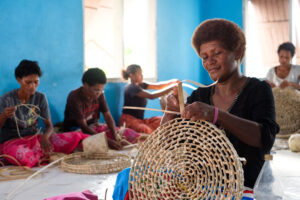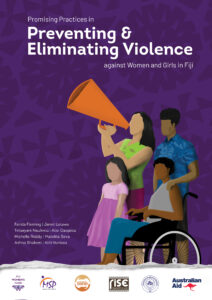Making sure no one misses out: Ways to prevent and eliminate violence against women and girls in Fiji
October 19, 2020
By Farida Fleming, Aliti Vunisea and Janet Lotawa

Women and girls in Fiji face some of the highest rates of violence in the world. The Fiji Women’s Crisis Centre’s (FWCC) 2013 violence prevalence study showed us that women and girls in Fiji encounter violence at twice the rate of the worldwide average. The prevalence of violence is even higher for women with disabilities, gender non-conforming people, women in rural and remote parts of the country and especially during times of crisis like in the current situation of COVID-19. So it is important to understand approaches that work for these women who face high rates of violence and traditionally miss out on violence prevention programs and services.
The women’s movement in Fiji has done an incredible job over decades to address violence. Frontrunners, Fiji Women’s Crisis Centre and Fiji Women’s Rights Movement, have paved the way for the recognition of violence against women and girls as a crime, support to women facing violence, lobby and advocate for gender-just laws and policies, and the critical re-examination of attitudes and behaviours that perpetuate violence. There has been much successful work done in Fiji over the last 30 years to eliminate violence.
But there is still more to be done. In fact, Fiji’s Ministry of Women, Children and Poverty Alleviation (MoWCPA) is currently leading the development of a National Violence Prevention Plan. This plan is about broadening the range of actors and engaging society as a whole in addressing violence. One of these actors is social enterprise Rise Beyond the Reef (RBTR) whose violence prevention work fits within this context.
Though seen by many as an organisation that creates economic opportunities for rural and remote women, RBTR was initially created to help address the alarming rates of violence and to bridge the divide between remote communities, government and the private sector. For more than ten years before starting the organisation, RBTR founders tried to assist family members – Fijian women in crisis in the rural and remote context – and found repeatedly that their unique needs and barriers were not addressed through services provided in urban centres. This was confirmed through a baseline study RBTR conducted in 2013 that found not only did women who were experiencing violence not prioritise accessing services, but they also did not articulate it as the worst or hardest thing happening in their lives. Rather there was a cluster of factors that were important to the women that were compounded by poverty of opportunities and knowledge (outside of their immediate surroundings). By creating women’s economic empowerment programmes, RBTR could build trust in the community and gain an entry point to have difficult conversations with traditionally patriarchal Fijian communities.
RBTR now engages with villagers and their leaders about gender equality and violence, based on the trust and relationships they have built. Teams engage communities in conversations about triggers for violence. Often men will raise factors such as Facebook and the financial pressure of traditional obligations. But RBTR facilitators work to get to the deeper belief systems that enable such behaviour. For example, participants unpack toxic norms that are handed to men and boys from an early age and the role that women can play in upholding these norms. This takes careful and culturally-informed facilitation.
The key from RBTR’s viewpoint is not to assume that behaviours will change because of a workshop or outreach session. Rather this work MUST be anchored by an ongoing mechanism such as women’s economic empowerment to leverage women’s standing and create a space for reprogramming of norms. The trainings and workshops help provide critical dialogue and tools – but it is the staying power through an activity that reinforces these changes in dynamics that creates lasting impacts AND allows for the communities themselves to author their path through the process. This is critical as the community dynamics are so different from one village to the next.

RBTR’s approach is one of four community and faith-based approaches to addressing violence against women that is supported by the Fiji Women’s Fund (the Fund). The Fund is a gender equality initiative of the Australian Government that focuses on eliminating violence against women, alongside empowering women economically, supporting women in decision-making and leadership, and facilitating coalitions for change.
More information about each community and faith-based approach is included in the Fund’s recently released paper titled “Promising practices in preventing and eliminating violence against women and girls in Fiji”. Other organisations featured in the research paper are House of Sarah, Medical Services Pacific, and Reproductive Family Health Association of Fiji. This paper is part of the Fund’s Promising Practices ongoing research series that seeks to inform and support good practices with the ultimate aim of improving the lives of women and girls in Fiji.
The paper shares four practices that the organisations use that align with practices that have been demonstrated as effective internationally. Grantee partners emphasise the importance of knowing the context and experiences of the specific women that each project works with, acknowledging that not all women are the same. They work at both individual and collective levels to address risk factors and structural drivers of violence. They work to engage men and boys in violence prevention efforts. They also contextualise tools and materials to the settings where they work.
Fiji is currently widening its efforts to prevent and eliminate violence against women and girls. This comes against the backdrop of widespread incidents of violence and a series of murders of women in 2019 that highlighted the unacceptability of violence and its terrible consequences. MoWCPA is leading the national violence prevention planning efforts and drawing on the implementation capacity of local partners. This context means that it is even more important to understand effective programming strategies to prevent and eliminate violence that works for women who would traditionally miss out.
About the Authors
Farida Fleming is an evaluator focused on social justice and gender equality. She currently provides technical advice and support to the Fiji Women’s Fund, Pacific Women Shaping Pacific Development, and Pacific Community.
Aliti Vunisea is a community development practitioner, researcher and advocate focused on increasing access and opportunities for rural and remote women. She serves on the board of Rise Beyond the Reef and provides technical advice to community organisations, governments and non-government organisations.
Janet Lotawa is a co-founder of the social enterprise Rise Beyond the Reef. She is deeply committed to changing the reality of life for women and children in the South Pacific through creative and effective community development strategies.
Recent Whats New
“She Sees Me Play”
June 30 2025
Women Lead Climate Action in Yavusania Village
June 29 2025
A Safe Haven for Women
June 20 2025
Victoria Yee appointed as Executive Director
April 1 2025
Leading Gender-Based Violence Awareness in Vanua Levu
March 19 2025

Leave a Reply